Free digital copy
Get Speciality Food magazine delivered to your inbox FREE
Get your free copy
Philippa Jackson, founder of Flavour Moments, is still on a high, she says, following a recent trip to Doha in the Middle East, where buyers have shown keen interest in her new ‘disruptor’ brand and its Goats’ Cheese Pearls.
Launched in April 2025, with work ongoing behind the scenes for nearly three years, Flavour Moments was conceived by Philippa following many years working for large retailers in the US and UK.
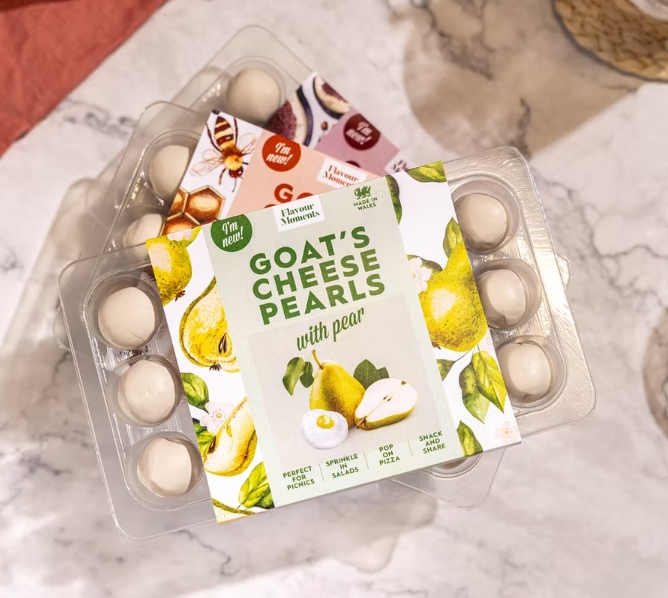
“I’d been looking at the category for a while, and it was becoming apparent to me that, for so long, cheese had no innovation or newness in it. If you think about it, when you walk into a supermarket, all the shelves have new products all the time, but you never really see that in cheese. The way it’s packaged, consumed and portion controlled has been the same for cheese for a long time. I wanted to create something that could really tell a story on the shelves, stand out, and also look really beautiful,” she said.
Flavour Moments are formed of Wiltshire-made goats’ cheese, moulded into ‘pearls’, with different jam-like fillings – currently Fig, Honey or Pear, but with the Christmas special of Truffle Honey soon to be part of the core range too.
The response so far has been “phenomenal”, continued Philippa. “People say they’ve seen nothing like them before. I’m thrilled, especially as I made the leap in June to leave my full-time job to focus on this. It feels quite refreshing to have that affirmation.”
New orders are being taken now for the cheeses, which have a shelf life of 28 days.
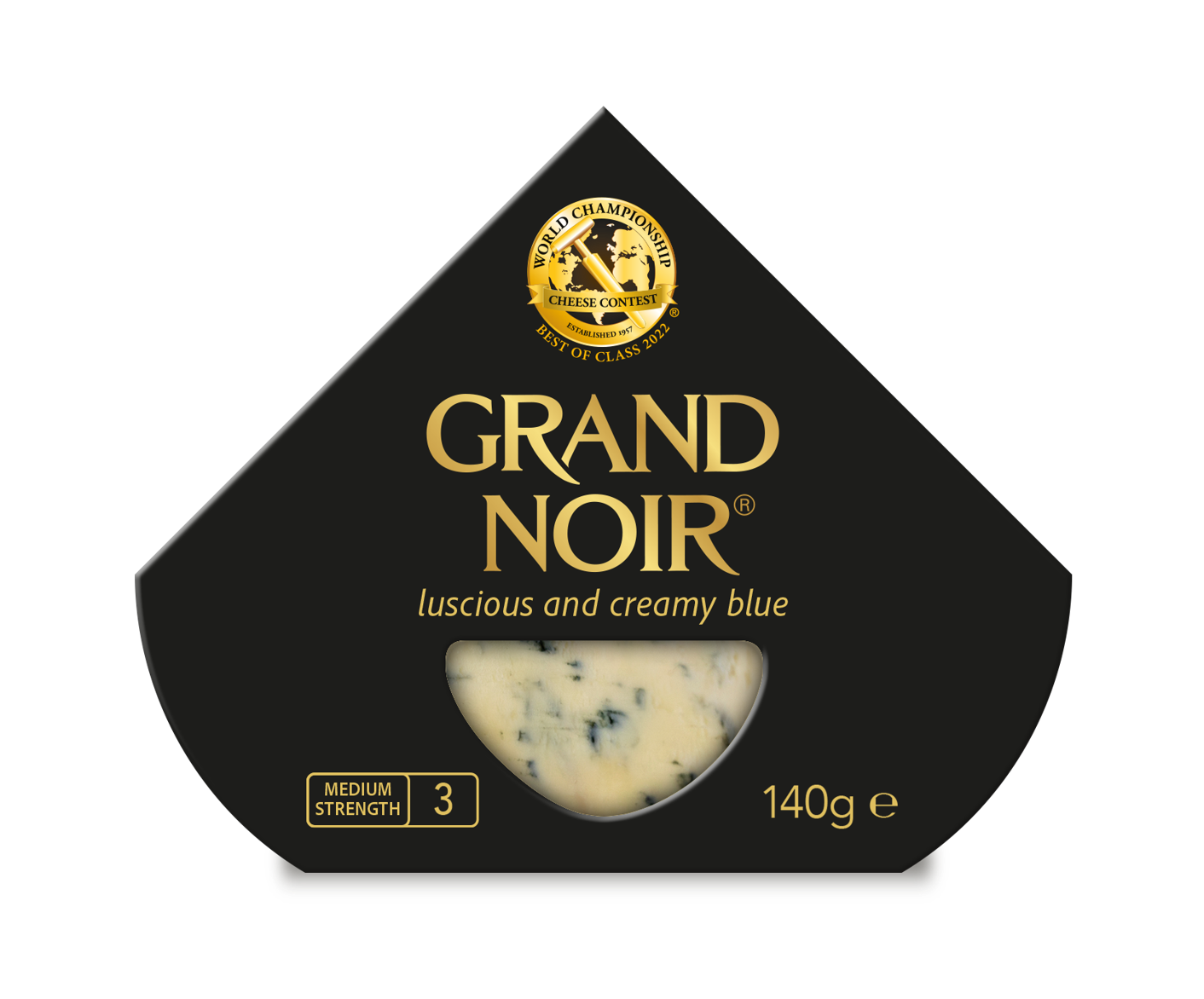
Champignon-Hofmeister’s creamy blue cheese, Grand Noir, is now available in 140g pre-cut portions, making it even more accessible for discerning shoppers in grab and go settings.
It’s the first time the cheese, traditionally only available in larger wheels at the deli counter, has been presented in a fridge-friendly format, and taps into rising consumer demand for smaller portions of premium products.
Grand Noir is lactose and gluten free, suitable for vegetarians, and is the ideal next step up from its sister cheeses – the creamy, mild, soft Cambozola and Montagnolo – being aged for around six months, with a more intense, sharp, sweet taste, and buttery finish.
Dominique Delacour, head of UK marketing for Tom Walker, which distributes Grand Noir, said, “Cheese buyers are increasingly looking for products that combine premium quality with ease of enjoyment at home.
“The new 140g Grand Noir format delivers exactly that - perfectly portioned for tastings, entertaining, or everyday indulgence during this time of the year. The product’s convenient size and premium quality give retailers a versatile SKU to drive trial, attract new shoppers, and boost sales in a diverse category.”
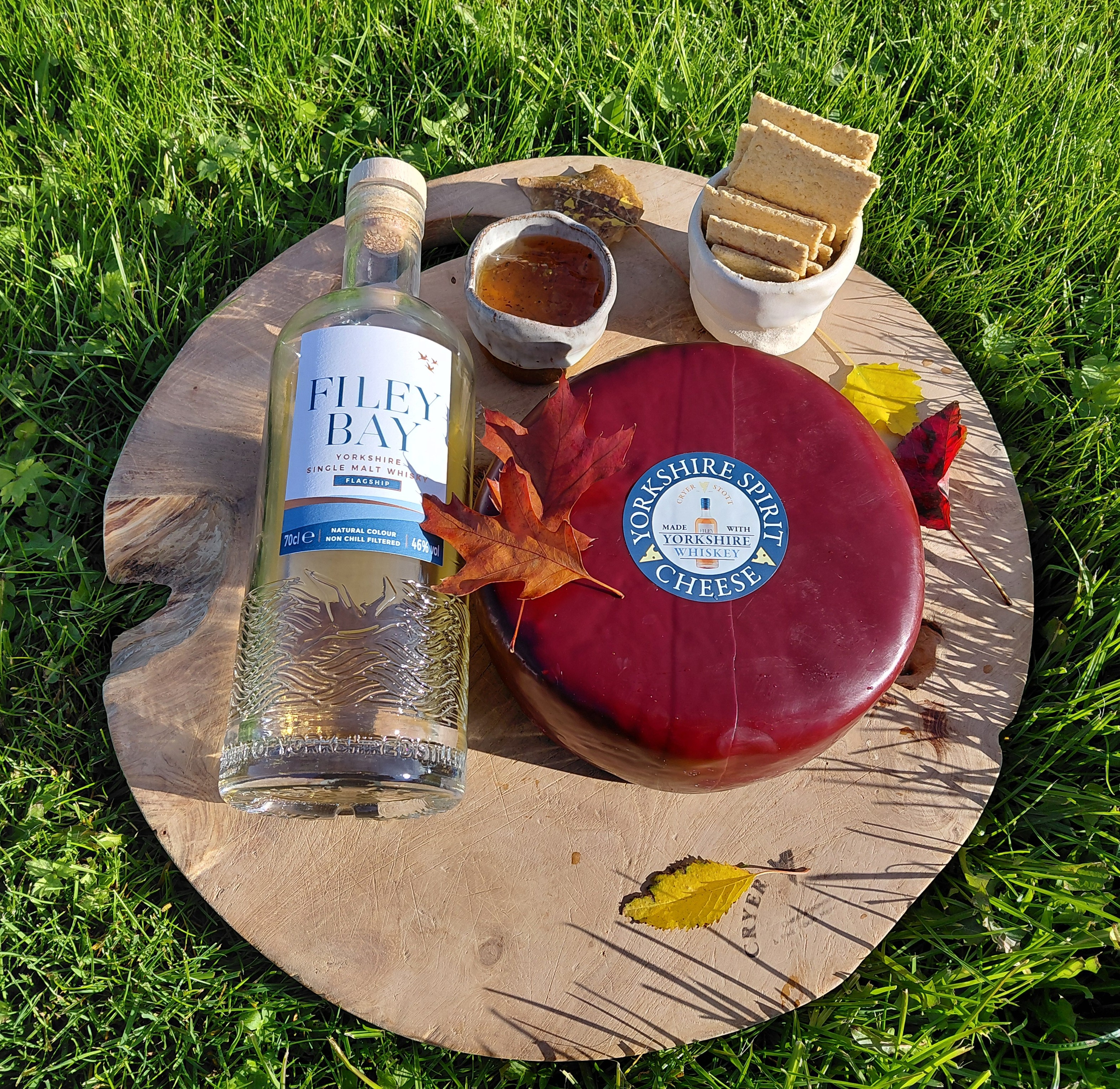
The team at Yorkshire-based Cryer & Stott have been enjoying their new blending facility immeasurably – saying it’s allowed them to work with even more local producers, to create unique, tasty and diverse new products.
The family-run wholesaler and maker of Rhuby Crumble (with forced Yorkshire rhubarb and vanilla), Yorkshire Cask (with Kirkstall Brewery Virtuous IPA and wholegrain mustard) and Sheffield Forge (with Henderson’s Relish), has released three new cheeses in recent months.
Business development manager, Jemma Ladwitch, said they’re constantly thinking of new ideas, and relish the opportunity to incorporate Yorkshire-made ingredients.
Yorkshire Spirit, infused with whisky from Filey Bay distillery, is something they’d wanted to create for a long time, she explained. “They’re so lovely to deal with and we like everything they stand for. Yorkshire Spirit is made with our mature Yorkshire Red. You get the sweetness and maturity of the whisky, and that blends perfectly with the maturity of the cheese, which is aged to around 12 to 15 months. It marries really well and is such good comfort food for winter.”
Two further cheeses have joined the collection alongside Yorkshire Spirit. 1606 Rebel combines Yorkshire Red with a Scotch Bonnet chilli jam from The Chilli Jam Man, and Knaves Mire melds York Gin’s rhubarb gin with Cryer & Stott’s Eh Up Yorkshire mature Cheddar.
All are available to retailers now.
“It’s our first year producing our own cheeses on site, so it’s been great for us being able to create our flavours with no red tape,” added Jemma. “We can come up with an idea and just make it. We’re also happy for farm shops or retailers, if they have an idea for a flavour to come and see us to create their recipes. It’s at 20kg minimum order.”
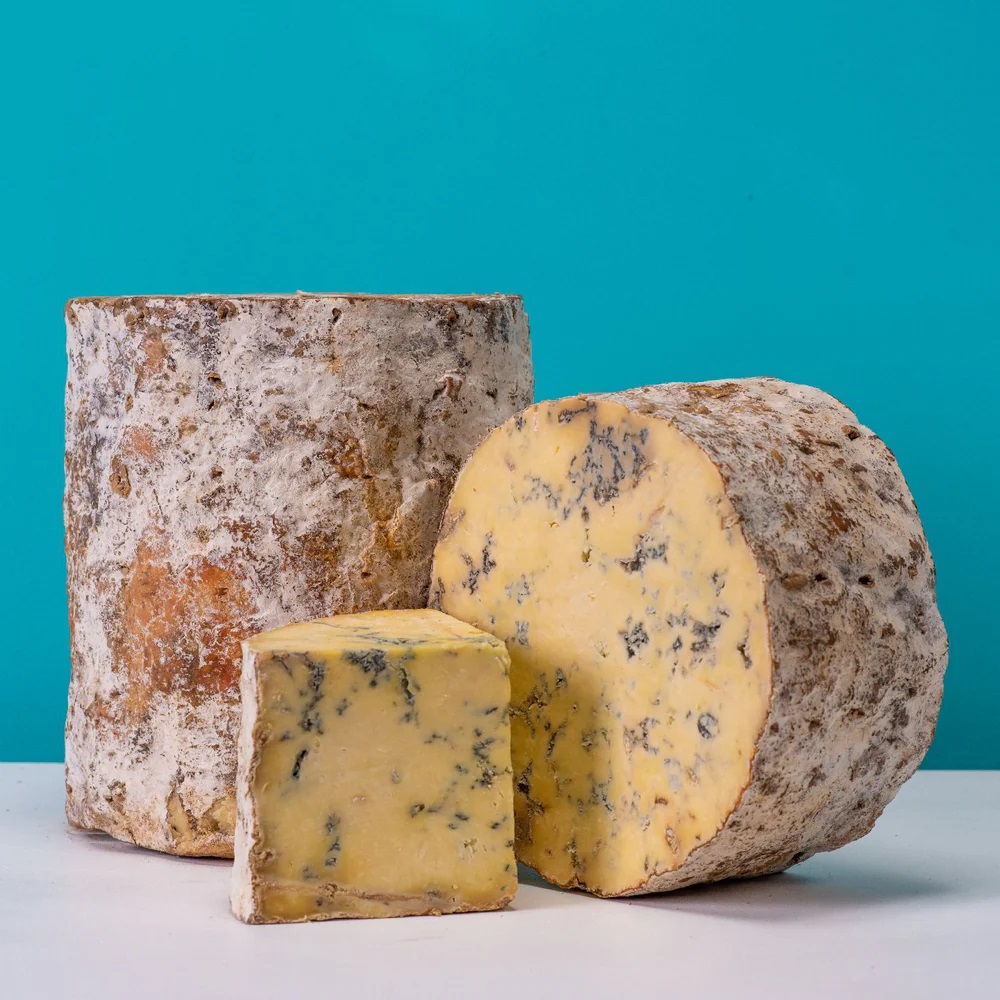
In the lead up to Christmas 2024 cheesemonger and cheesemaker Mike Thomson (of Belfast’s Mike’s Fancy Cheese) faced one of the biggest challenges of his career so far.
Stepping into the maturing rooms where his blue, Young Buck, was on the last part of its journey before retailing, rather than seeing wheels of mottle-edged beauty before him, Mike witnessed a total meltdown of the products, as the room’s temperature control had malfunctioned, taking the space to a balmy (and not suitable for keeping cheese) 30C.
“If it had melted at any other time of year it would have been fine,” he reflected, “but because it was Christmas week, all hands were on deck in the shop. I put the cheese to bed and thought ‘that’s us until Christmas’, but when I looked in to make an Instagram photo in the final push, it had all melted – 350 wheels!”
Thankfully the Christmas stock had already been taken for the season, but the incident put the maker on a backfoot. The maturation room hadn’t been empty in 11 years.
Buoyed by other award-winning makers, who got in touch to tell Mike of their own disasters, Mike picked himself up and dusted himself off, and stocks of Young Buck are back in the swing for 2026 onwards.
“We were able to keep making at the time,” he revealed, “but the production was smaller. We had another room where we could mature the cheese, and could only do around a quarter of what we did before.”
It wasn’t until July that storage levels reached what they were before, allowing Mike to up production. “Everything last year was about bringing Young Buck back!”
The raw milk blue is made in 8kg rounds, crafted entirely by hand three times a week, and aged for a minimum of three months. It transfers between three maturation rooms during its life, developing fruity, fresh flavours, a slightly crumbly texture, and a buttery mouthfeel.
Mike said it’s “lovely” to have to back and also thinks the disaster of losing so many cheeses has helped him to be even more resilient. “We know we can destroy everything and continue as a business,” he joked, “which is a good thing. The hardest thing, and something I’m very bad at, was saying ‘no’ to people who wanted the cheese because supply was so limited and we had to keep some back for ourselves. That was tough. But we’re now getting out more, doing tastings and getting back to normal. It’s almost like it never happened. And we’re so grateful for the support we had. We’ve been very well supported by the cheese community.”
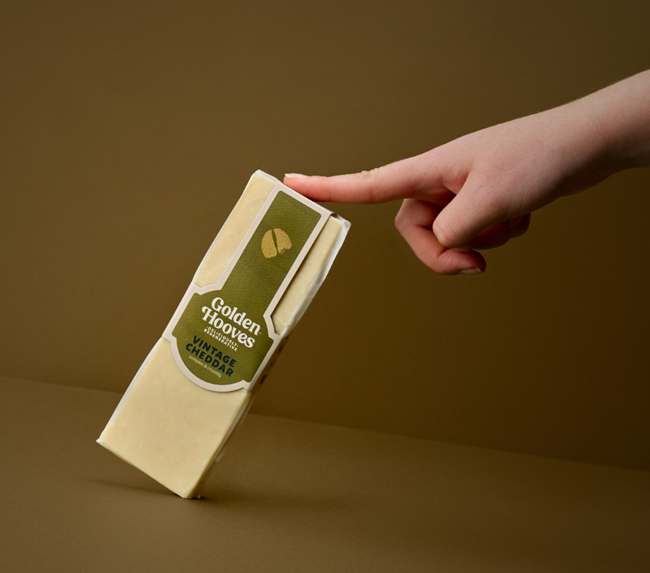
First Milk, the farmer-owned dairy co-operative behind regenerative food and drink innovator, Golden Hooves, has revealed the results of its Impact Report for 24/25.
Amongst the results are the potential of a 78% increase in soil carbon sequestration, up to 203,000 tonnes CO₂e - the equivalent of planting a staggering nine million trees – as well as a decrease of 3.4% in the carbon intensity of the co-op’s milk, with data collected rigorously from all corners of the business, including over 700 family-run farms.
First Milk member farms currently take in over 360,000 trees, 5,564km of hedgerows – greater than the distance between London and New York – and rotational grazing of cows on 48,000 hectares of land, up 54% since 2024. With a 6% increase in land within the co-op’s regenerative programme year-on-year, up to 89,977 hectares, which would be comparable to 125,000 football pitches, even more of Britain’s landscape is now able to benefit from the First Milk programme.
Leona McDonald, director of Golden Hooves, said the Impact Report is “hugely exciting”. “We now have the data to show that regenerative farming delivers real benefits for farmers, nature, and consumers alike. Golden Hooves gives us license to celebrate this progress out loud – bringing food lovers great products, real stories, and proof that fantastic flavour and fantastic farming go hand in hand. With momentum building and more recognition coming our way, the numbers show that regeneration is here to stay. So look out for our hoof – it is proof that the product you are buying is 100% deliciously regenerative – and join the Regen Revolution!”